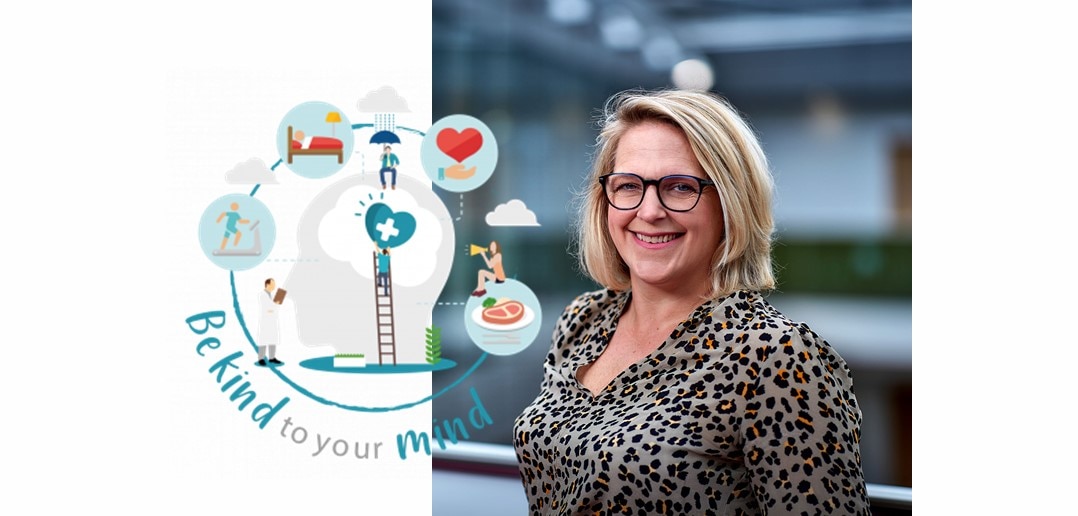Throughout October we’ve been focusing on all things mental health and exploring ways to ‘be kind to your mind’. We’ve been meeting with colleagues from across CUK, including our mental health volunteers, to find out what they do day-to-day to improve their wellbeing.

In the first story in our new leadership series, we chatted with Jo Phillips, Chief People Officer.
Jo tells us about the importance of striking a good work life balance and shares some mental health and resilience top tips that have helped to ensure her wellbeing is always a priority.
——–
I’m fascinated by the human brain and how our minds work. My mind is my biggest ally when I stay tuned into it, nurture it and guide it… it can be the opposite though when left unchecked to create its own narrative or take it’s own path! Mind and body balance is foundational for me and something I work on actively because I know how much happier it makes me. I don’t always get it right but have learned how to recognise when something needs focus and have a box of tricks to dip into, to balance things out.
Earlier in my career I took part in a Wheel of Life exercise. It’s a great way of helping you to identify areas of your life which are important to you and allows you to evaluate how you’re currently spending your time matches up to this. It was this exercise that made me realise I’d got the balance all wrong and that something needed to change – and that work life balance is a choice!
There will always be times where work needs more than normal to get things done (that’s just a reality of life); when that’s the case I do what needs doing but choose not to deprioritise the things that I know support my wellbeing:
Get moving
Since we’ve introduced hybrid working, I’ve been able to reinvest some of my commute time into exercise. Pilates is honestly the thing that’s made the biggest difference to me over the years; it’s my way of tuning into how I am, so that I recognise when I need to focus on me a bit more. It’s my go to, it creates calm and connection within me and it helps me manage how I feel mentally and physically.
Did you know?
Physical activity has a huge potential to enhance our wellbeing. Even 10 minutes of brisk walking increases our mental alertness, energy, and positive mood. Research on employed adults from The Mental Health Foundation, has found that highly active individuals tend to have lower stress rates than less active individuals.
A good routine
I always make space for thinking and doing in my diary. Without this time to focus, it’s easy to get scooped up into meeting mayhem – which I know is counterproductive and means I don’t bring my best self to what I’m doing.
Outside of work I also have a healthy routine when it comes to sleep. I try to go to bed and get up at the same times each day, and have a digital detox before bed, with no screens in the bedroom.
Did you know?
Devices such as computers, smart phones and tablets emit blue light which stop us from producing melatonin (the sleep hormone) – so scrolling on your phone before bed means you’ll end up feeling more awake rather than sleepy. Using these devices in the bedroom can also train our brain to associate the room with a place of alertness rather than sleep.
Be grateful for the little things
I’ve spoken before about practicing daily gratitude, which helps me notice and appreciate moments of value from the day. I jot three things I’m grateful for down before I go to bed. It’s something I’ve done for years and genuinely helps me to keep a healthy perspective on how things are going in my life, despite the challenges I may have faced in the day.
Top Tip:
Keep a short, daily gratitude diary, capturing the positive things you’ve experienced that day. It doesn’t have to be big achievements you’re grateful for. Appreciating the little things can make a big difference too.
Know your limits
Asking for help has been key for me – and recognising that there’s no shame in asking for support when you need it! Early on in my career I didn’t ask for help enough, and that can really take its toll. Now, I’m far better at speaking up and asking for support if things feel like they’re spiraling or are unrealistic.
We’re here if you need us
Looking after your mental health should always be a priority. At CUK, our Mental Health First Aiders (MHFAs) and Champions (MHCs) are all colleagues who’ve volunteered their time to take on the role of listening and signposting people to support when they need it.Our MHFAs have all completed an accredited MHFA England course and are equipped with skills to lead confidential mental health colleague conversations, alongside raising awareness, reducing stigma and discrimination. Our MHCs have completed a CUK Mental Health Awareness course and are equally equipped to help colleagues by connecting them to additional mental health support.
If you’d like confidential, mental health support, you can contact any of our MHFAs or MHCs here.

